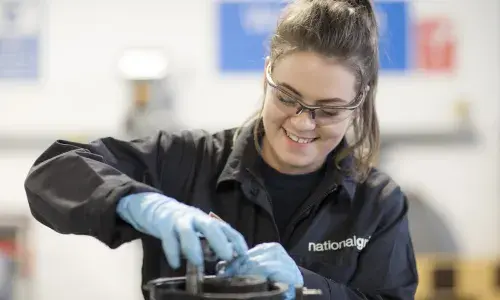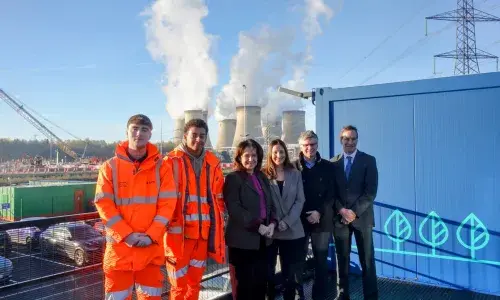
National Grid launches the ‘Green Light Signal’, a world-first to help Brits make smarter energy choices to tackle climate change
- New research from National Grid reveals 38 per cent of UK adults feel hopeless about climate change and worry about the future of the planet. This is fuelled by an ‘energy awareness gap’ with 42 per cent of Brits mistakenly believing that Britain only gets up to 10 per cent of its electricity supplied by zero and low carbon energy sources. (Actual = 55%)
- Carbon jargon is making it more difficult for Brits to engage on the issue with many having never heard of terms like carbon neutral (42%) or net zero (61%). Only 10 per cent of UK adults have heard of COP26 – the UN climate conference to be hosted in the UK this November.
- Half (51%) of Brits said they would feel more hopeful if they understood the steps Britain is taking towards reaching net zero whilst two in five (41%) would feel more positive if they knew the cleanest time of day to use electricity.
- To help, National Grid is launching the Green Light Signal – a new low-energy smart bulb that shows people the cleanest times to use electricity.
Climate change is the defining challenge of our time. Yet one in ten UK adults (10%) believe we will never solve it according to a new study by National Grid*, and more than a third (37%) believe we have reached a tipping point and have passed the point of no return.
Why are people feeling hopeless about climate change?
An ‘energy awareness gap’ in people’s knowledge about the positive steps Britain has undertaken to be less reliant on fossil fuels seems to be the main cause of hopelessness. 42% of Brits incorrectly believe that Britain only gets up to 10% of its electricity from zero and low carbon energy sources. In fact, clean energy like wind, solar and nuclear account for an average of 55% of Britain’s electricity mix. Outdated views on our reliance on fossil fuel also aren’t helping. One in ten (11%) think Britain gets 71–90% of its electricity from fossil fuels, while nearly a quarter (23%) mistakenly believe that Britain generates 51-70 % of its electricity from fossil fuels. The actual average figure is 36%.
Carbon jargon is another factor preventing people from engaging on the issue of climate change. Brits haven’t heard of terms like decarbonisation (77%), carbon capture (74%), net zero (61%), green tariffs (49%) and carbon neutral (42%). And just 10% have heard of COP26 – the UN climate conference to be hosted in the UK this November.
However, over half (51%) of Brits said they would feel more hopeful if they knew the steps Britain is taking towards using more zero carbon energy. 41% said they would feel better if they knew the best time of day to use energy, while 47% said they would feel more positive if they knew how much of their energy came from renewables.
The Green Light Signal
In a bid to help Britain understand where it gets electricity from, National Grid has launched the Green Light Signal – a low-energy light bulb designed to glow green when the electricity supply at home is cleanest so people can make smarter energy choices. The clever gadget is powered by National Grid’s carbon intensity API (carbonintensity.org.uk), a carbon intensity forecasting tool with a regional breakdown, built by the electricity system operator, WWF and The University of Oxford and The European Defence Fund.
John Pettigrew, Chief Executive of National Grid, said: “Climate change is the biggest crisis humanity faces. As a Principal Partner of COP26, we want to give people hope by making them aware of the transformational changes taking place in the energy sector as we move towards a clean energy future. Great Britain’s energy system hit a new green record earlier this month with almost 80% of electricity coming from zero carbon sources, and in the last seven years we have cut carbon emissions from the electricity system by 66%.
We know there is still lots to do, but by showing people the progress that’s been made and bringing them together to better understand energy consumption with tools like the Green Light Signal, collectively we can make a real and significant impact in the fight against climate change.”
The Power of All
70% of Brits believe that individual efforts to save electricity and use greener energy sources can make a difference in the fight against climate change. And increased news coverage on the topic has led a whopping 89% to be more mindful about the way they use electricity at home.
Top ways Brits are trying to make greener energy decisions at home include filling the kettle with only the amount of water they need when boiling (52%), wearing more layers to negate the need to heat the home (44%), having short showers over baths (43%), reducing the amount of laundry washed (31%), and leaving the oven door open to heat up the home after use (28%). However, 15% of Brits do not believe that individual efforts to save electricity will help fight climate change.
There are also things we will not contemplate giving up in the fight against climate change – using computers less (50%), eating less meat (45%), eating less fish (43%), and drinking less coffee (42%) top the list. For millennials, streaming services like Netflix (42%) just could not be sacrificed, while giving up eating avocados to help fight the climate crisis proved a bridge too far for a further quarter (25%) of Gen-Z and Millennials.
National Grid in the UK:
- We own and operate the electricity transmission network in England and Wales, with day-to-day responsibility for balancing supply and demand. We also operate, but do not own, the Scottish networks. Our networks comprise approximately 7,200 kilometres (4,474 miles) of overhead line, 1,500 kilometres (932 miles) of underground cable and 342 substations.
- We own and operate the gas National Transmission System in Great Britain, with day-to-day responsibility for balancing supply and demand. Our network comprises approximately 7,660 kilometres (4,760 miles) of high-pressure pipe and 618 above-ground installations.
- Other UK activities mainly relate to businesses operating in competitive markets outside of our core regulated businesses; including interconnectors, gas metering activities and a liquefied natural gas (LNG) importation terminal – all of which are now part of National Grid Ventures. National Grid Property is responsible for the management, clean-up and disposal of surplus sites in the UK. Most of these are former gas works.
National Grid undertakes no obligation to update any of the information contained in this release, which speaks only as at the date of this release, unless required by law or regulation.
About the Bulb:
The Green Light Signal uses the LIFX Mini Colour bulb. They are 20 per cent more efficient than the closest competitor. You can purchase your own LIFX bulb and connect it to the electricity system operator's Carbon Intensity Forecast following the simple instructions at www.nationalgrid.com/greenlightsignal


